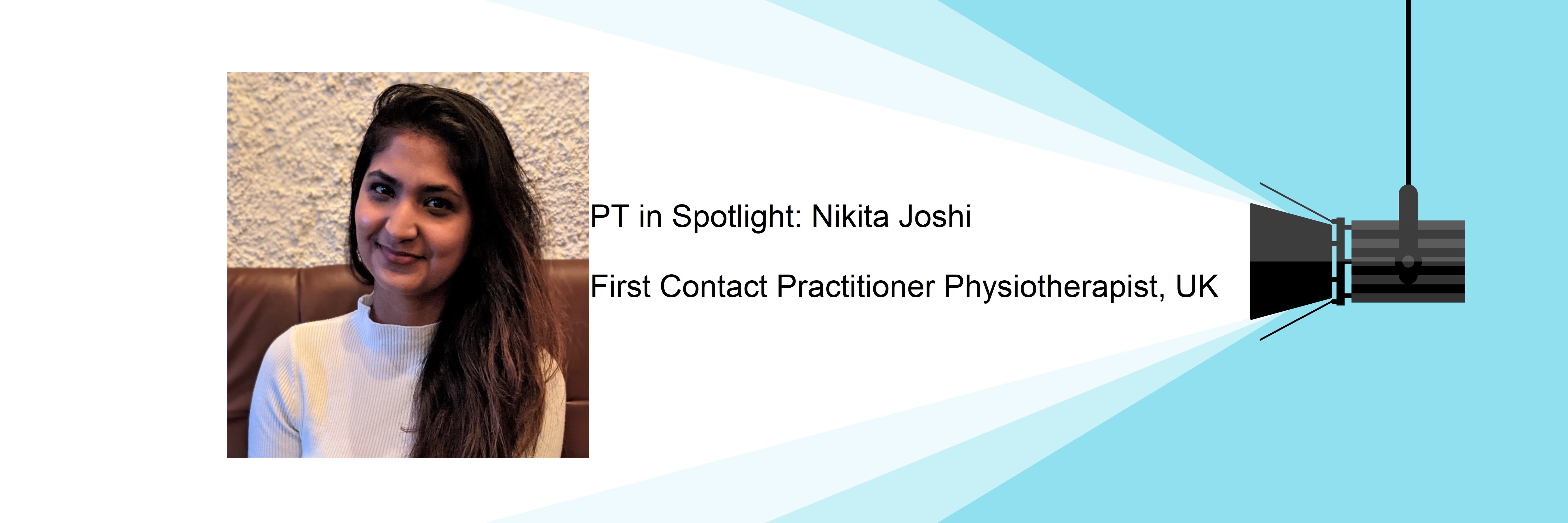
This week’s spotlight features Nikita Joshi who is currently working as a FCP physiotherapist in UK. Nikita completed her MSc in Physiotherapy from Cardiff University, UK. Due to the pandemic her student visa ran out. She recently moved back to the UK having found a job from India. Go ahead and read Nikita’s spotlight for more insights about pursuing masters in UK and finding work after that!
What is your name, job title and workplace?
My name is Nikita Joshi. I am a physiotherapist currently based in Surrey, UK. I work as a FCP (First contact practitioner) Physiotherapist.
What is your educational background?
I completed B.P.Th from MUHS after which I worked in Mumbai, India for 18 months. I moved to the UK to pursue MSc Physiotherapy at Cardiff University, which I completed in 2020.
Why did you decide to pursue MSc Physiotherapy in UK?
I was always clear about wanting to explore education abroad. As soon as I entered the third year of undergrad physiotherapy, I was sure that studying abroad would open my eyes and mind a lot more. I knew it would expose me to the healthcare practices and work culture of a different country.
Initially, I had applied to the US, Australia and the UK. By the time I started working, I realised that my main aim for doing a masters degree was to learn more about research since it aligned more with my long-term goals. UK perfectly aligned with my goals as well as the financial considerations for masters.
What were the universities you considered?
- Cardiff University
- Coventry University
- Middlesex University
- University of Kent
- Queen Margaret University
- Manchester Metropolitan University
Why did you choose Cardiff University?
Cardiff University especially was a perfect fit for my goals and ambitions. It is a part of the Russel Group of Universities which means that it is a research-intensive university. From the start to the very end, I was most thankful for all that my course taught me. It was structured to be very research-driven and the grading was always fair but strict. With final dissertation requirement being 20000 words, it gave me an opportunity to build my study up from the planning to the execution which has been the greatest learning curve for me thus far, academically. Additionally, the bonus was that not only did I learn how physiotherapy is practiced in the UK, I also learnt about the practices in many countries around the world, thanks to a diverse student group.
Tell us more about the application process for the course
Requirements and eligibility may change with different universities, courses and year of intake. However, a general guide to getting an admit from a good university would be:
- Good and steady grades
- Work Experience
- Good internships
- Co-curricular and extra-curricular activities, if any
- Interest demonstrated in research from undergraduate days.
Did you go through any counselor?
I chose Edwise International as my counselor. I was very happy with their services, they helped me every step of the way. When it comes to applying to the UK, I would recommend considering them.
What was the process to apply for the visa?
I do not have the exhaustive list and the list of documents may change as well. However, in 2018 I needed Passport, CAS certificate, financial details (Loan/other proof of savings), IELTS scores, NHS Surcharge payment confirmation, visa application form. Once all documents are in order, one may book the appointment date for the visa. In Mumbai atleast, Tier 4 visa processing was done by VFS Global (When I applied). They generally offer services to verify the documents and upload it. Alternatively, counselors help with these steps, too.
How difficult was it to obtain a student’s visa?
Provided you have all the documents necessary, obtaining a Tier 4 Student visa is fairly straightforward.
Tell us more about your course
My course was 18 months long and was categorised into core modules and optional modules. The core modules were structured for better knowledge about research and the course offered a range of optional modules. I chose Musculoskeletal Diagnosis and Treatment and Clinical Kinesiology and Tissue Pathology. The teaching environment was very tactfully designed, in my opinion. We had a mix of lectures, one-to-one discussions with our respective mentors as well as group discussions. Being an international student, group discussions particularly helped me gain better understanding on how the healthcare system works in the UK.
What did you like about your course? What you did not like?
I quite enjoyed the learning environment. Not only did I have all research and technical resources at the university, the study spaces were all-equipped, too. We would attend the research core modules with fellow Radiographers, OTs and Nursing students. This led to mingling of different healthcare disciplines. The interactions within and out of classes encouraged a more holistic approach in way of thinking. The teaching staff were extremely knowledgeable and experienced. Although they were humble and approachable at the same time.
Editor’s note: Read this blog post by Nikita to get more insights about her course in UK.
How difficult was it for you to complete the course?
As I mentioned earlier, my course was research-intense course. The grading was strict. That was particularly difficult in the first few submissions. However, the most difficult and trying time was to get the approval from the ethics board (Very strict) at the university, only because of the time crunch. The uncertainty of the approval was so stressful that the whole process of data collection and writing the dissertation seems like a cakewalk after that.
How much were overall expenses? (Tuition + Cost of living)
About 23-25 lakhs INR.
What are the job prospects for a physiotherapist in UK after your course?
I believe the job prospects have greatly improved for those on Tier 4 visa as they now get a visa extension of further 2 years.
How difficult is it to obtain a work permit/license?
In the UK, along with a valid visa, one requires HCPC Registration and CSP number in order to be able to work as a physiotherapist. Once all the required documentation is in order, it may take upto 60 working days for HCPC registration to come through. However, there could be delays due to the pandemic situation.
Tell us briefly about obtaining a work permit in UK after your course?
In the UK, a student on Tier 4 visa now would get an extension for 2 years to work in the UK.
In my case, I did not have that. I had to apply for a job from India and I was offered a job sponsorship by my current employer.
What are you doing presently?
I am working as FCP ( First contact practitioner) Physiotherapist. I work in the GP Surgeries and am primarily responsible for triage of musculoskeletal cases telephonically or face-to-face, discuss patients’ conditions and options, offer advice and/or make appropriate referrals. The role of FCP requires a sound amalgamation of knowledge, assessment, clinical reasoning and communication skills.
What are your future plans?
I am very happy with my current role as it offers me a lot of learning opportunities and more autonomy as I progress at work. In the future, I aim to be certified in Injection therapy and social prescribing.
What is the advice you would give to PT students who want to pursue higher education in UK?
My advice would be to explore all opportunities, plan in advance (Maybe from 2nd year itself), build a good portfolio of academic, co-curricular and extra-curricular achievements.
It is an exciting time to be in the UK as physiotherapy role is seeing a great uplift. All the best to everyone planning to move here!
Where can people reach you?
They can reach out to me on LinkedIn.
Hello, My name is Tejashree Limaye. I am a physiotherapist with 10+ years of experience. I help you go from being stuck in your career to finding a job you love! I provide career guidance about clinical and non clinical PT career in India. I also help you with US PT licensing process. Welcome to my blog, I hope you find the exact guidance you have been looking for!
